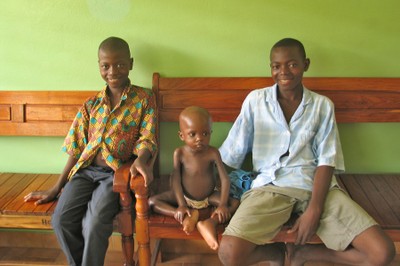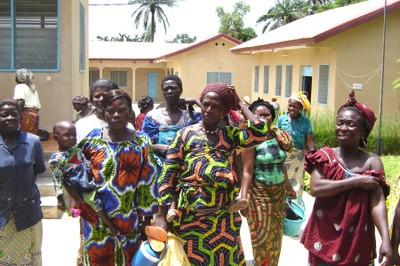Togo – SOS Medical and Social Centres
In Togo there are currently four Social Centres and two Medical Centres for children and the local community, including those in Dapaong, Tome and Kara. Many SOS Social Centres operate via Family Strengthening Programmes, which aim to support the wider community. Below is some information about some of the Social Centres that SOS Children runs in Togo:
SOS Medical Centres around Togo: In-Depth
 Kara
Kara
Description of SOS Medical Centre:
The SOS Medical Centre, which has existed since 1982 and was expanded in March 2002, is used by around 30,000 patients every year and focuses on caring for mothers and children. In addition to a general clinic for outpatients, a dispensary and a laboratory, the ward also has a nutrition centre (together with rooms for relevant courses) and a maternity ward. Many mothers from far and wide take their malnourished and sick babies to the clinic as outpatients or inpatients and obtain information on how to look after their babies well and on good nourishment.
Work and Achievements:
During the year 2009, the total of people seen in consultation was 8,499 and concerned 102 SOS children, 4,161 external children and 4,236 adults. 58,495 services were provided by our structure, including all kinds of activities. Although the services are not selective according to the target population, it is important to recognize that mainly, (67.3%) of children and (25.3%) of women are in care. Apart from the routine activities, a new activity, namely the prevention of the HIV/AIDS transmission from mother to the child was added to the list of our preventive activities (including vaccination, educational talks, and the care for the malnourished children) since November while including 20 expectant mothers. The distribution of medicated mosquito nets also continued for the profit of the expectant mothers and children under 05 with more than 1000 distributed mosquito nets. Moreover, 129 malnourished children were under surveillance in our structure. All these services were enriched by the support of a Belgian mission from December 7th to 16th. During This mission, 36 gynecological consultations, 72 scans and 07childbirth were carried out.
Dapaong
Work and Achievements:
The SOS Social-Medical Centre of Dapaong cared for a total of 854 people, including 96 SOS children, 551 external children and 207 adults. In terms of benefit, the Centre received for consultation, treatment and other social support 2518 people (1277 men and 1241 women). This number concerned 2084 consultations (1577 children and 506 adult people) in matters of health, 197 recipients of the family strengthening program (FSP) of Naki-West, and 237 specific cases for social support. It is worth recalling that the social-medical centre strengthened its staff by recruiting 2 new collaborators: 1 lab technician and 1 pharmacist. At the medical department, the number of consultations increased from 1740 to 2084 cases. In all, 160 children were vaccinated in the centre. Each month an average of 30 mothers from the surrounding communities benefited from Information, Education and Communication (IEC) sessions on various topics (including, hygiene of the dwelling place, appropriate use and reading of the clinical thermometer, HIV/AIDS, vaccination, child’s rights, etc.).
SOS Social Centres around Togo: In-Depth
 Kara
Kara
Description of SOS Social Centre/FSP:
In 2004 two SOS Social Centres were opened: one offers "Help to Self-Help” and consists of a classroom, workshops for practical teaching, consultation and conference rooms, IT classes, a library and an open multi-purpose hall with a storeroom. Each year more than 10,000 people use the Social Centre and its facilities. The other social centre is specialized in educating and supporting those in need, particularly those families who have been affected by HIV/Aids.
Work and Achievements:
The Social centre has just completed its 5 years of activities (2004-2009) during which many families improved their living conditions thus making it possible to several children to enjoy their basic rights (3 meals per day, right to the identity, right to health, right to schooling, right to leisure). In the same way, some communities started experiencing the local participative development.
This year, the Centre has supported 13,247 beneficiaries. So the assignment of the Social Centre being to lead the underprivileged families towards a greater comfort, the activities, like the other years, concerns the session lending a sympathetic ear for better determining the difficulties of the recipients before proposing supports. As results from the activities of support, one can quote the making of 189 birth certificates, the acquisition of experience in matter of local development in the Kpalassi and Kpangazipio communities in the canton of Awandjélo with the installation of the Community infrastructures such as the health cabin, the building of two classes equipped with 30 desks each and two mills thanks to the financial contribution of the UNICEF. The awareness growing within the population in these localities on the children’s rights to schooling, lead to conscience awakening especially, within the Peuhl community. All the children in school age were registered. The project of well digging in the villages of Lamafeing and Lassa Elimdè, financed by the International organization of the French-Speaking Areas (OIF), started in November.
Dapaong
Description of SOS Social Centre/FSP:
The SOS Social Centre runs family-strengthening programmes to support needy families and children from the neighbourhood. It also includes a small medical centre, which offers basic medical care to the people of the neighbourhood. The SOS Social Centre provides social services such as parent counselling, support during the job hunt, family-supporting measures, distributions of food items and medicines, scholarships for children etc. The aim of the family-strengthening programmes is to keep families from falling apart and thereby prevent children from being taken out of their familiar surroundings. The co-workers of the SOS Social Centre can look after 100 children from needy families
Work and Achievements:
The family strengthening program that is in its second year of implementation was primarily marked by the activities of the Children Abandonment Prevention project, Violence and Children Mistreating (PAVME) in Naki-West in the Prefecture of Tône. For the year 2009, the number of recipients evolved from 130 to 197 children including 107 boys and 90 girls. As far as food is concerned, the recipient families were supported with the distribution of food kits once per quarter with a special composition for the end of the year’s feasts.
Talking about school, 112 children, including 50 girls, had been registered for the school year 2008-2009. At the end of the aforementioned year, the steering committee of the project recorded 69 (39 boys and 30 girls) successes out of 98 children registered starting from the primary education who sat for exam; that is to say, a success rate of 70%. Eight other children (5 girls and 3 boys) excluded from the school system were placed in training of dressmaking (for the girls) and tailoring (for the boys). At the school resumption 2009-2010, 166 children (95 boys and 71 girls) profited from the support of the program.
Lome
Description of SOS Social Centre/FSP:
The devastating impact of HIV/Aids finally led to the creation of an SOS Social Centre in Lomé in January 2004 which educates and supports those in need and is focused on those families who have been affected by this immunodeficiency disease.
Work and Achievements:
The FSP of Lomé continued its activities with the care of 199 recipients children including 101 boys and 88 girls in 99 families compared to 201 children dealt with during the year 2008. Some families which have become self-reliant and others which are not more interested in the group activities also left the program.

 Return to Schools Wikipedia Home page…
Return to Schools Wikipedia Home page…
